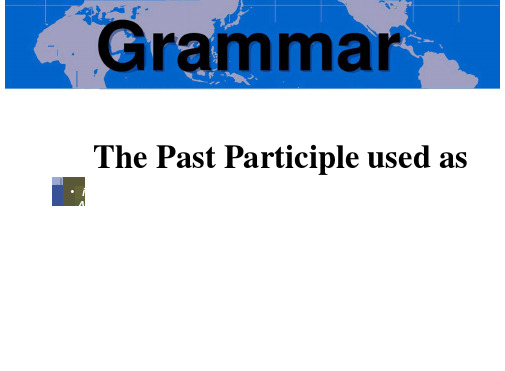浙江省天台县平桥第二中学高中英语课件:Unit1FriendshipGrammar(新人教必修1)
- 格式:docx
- 大小:1.52 MB
- 文档页数:44






The Past Participle used as J•iAAttribute and Predicative 课文回顾请翻译下列课文中出现的带有过去分词的句子。
①He found that it came from the river polluted by the dirty water from London.他发现霍乱来自于被伦敦污水所污染的河流。
②S o many thousands of terrified people died every time there was an outbreak.每次霍乱暴发时,就有大批惊恐的老百姓病死。
③He immediately told the astonished people in Broad Street to remove...他叫宽街上惊慌失措的老百姓拆掉④But he became inspired when he thought about helping ordinary people exposed to cholera 但一想到帮助患上霍乱的普通老百姓, 他就很受鼓舞。
⑤He became interested in two theories...他对这两种推测都很感兴趣.……While- class课本P51. Look at the following sentences where the past participle is used. Find two more examples in the reading passage of each usage.EXAMPLES:So many thousands of terrified people died.,, (Attribute)He found that it came from the river polluted by the dirty water from London. (Attribute) But he became inspired when he thought about helping ordinary people.., (Predicative)过去分词具有动词的性质,同时兼 有形容词或副词的性质,在句中可以作 表语、定语、状语和补足语。
Unit 1Friendship高考中此类信件多属于半开放性作文,要求考生根据所给的材料(多为征求建议信),提出合理化建议,或者给出有针对性的解决办法。
建议信除了遵循书信的格式之外,还要求在信中针对别人的问题,给出你的观点及解决办法,常用于建议的句式有:令用旬式In my opinion, you should …My opinion is …I believe we should ...I don,t think it,s necessary to …I advise you to ...We must decide ... I" m afraid that...I think you should ..・Don, t worry ...I agiee ...I don' t agree ・・・I think so.I don" t think so …注意格式(书信格式);客观地提出建议;' J 针对对方的问题,给出你的观点;语言要委婉、精炼,同时要简洁,表达清楚。
开门见山,表明写作意图。
在本段中,写信人应该先简单介绍自己,然后陈述事由,表明写信的目的及原因。
委婉地提出建议及改进措施,或提出忠告。
礼貌地总结并期盼对方的回复。
Miss Wang has received a letter from Xiao Dong. He is also asking for some advice. Read the letter carefully and help Miss Wang answer it.Dear Miss Wang,r m a student from Huzhou Senior High School. I have a problem, T m not very good at communicating with people. Although I try to talk to my classmates, I still find it hard to make good friends with them. So I feel quite lonelysometimes. I do want to change this situation, but I don' t know how. I would be grateful if you could give me some advice.Yours,Xiao DongDear Xiao Dong ,r m glad to receive your e-mail. You ask me something about _________________ (建议的主题).The following is my adviceIn my humble opinion, you would be wise to take the following actions, (建议的内容).withiakiiT®gsf;iainidl^ou do want to ______ changeYou have trouble inthis situation.You must be fri make friends with them. You,d better look after others more than ___________yourself巧列提纲,详略得当:针对问题需要提出什么样的建议,要讲哪些内容,应该先列出提细,并要做到内容重点突出、详略得当、井然有序,达到提纲挈领的作用。
toA ln1+c6*1A L u4Reading for vocabularyMatchingI particularly■ architect 、/ ■ __= __________» a person whose job is to■ in particular design buildings, etc.■ dignity 、■ access to■ basementReading for information■ What can we do to make the cinema convenient and comfortable for the disabled?What can we do?1.Adequate access for wheelchairs2.Earphones for people who have troublehearing3.Raised seating/a space for people inwheelchairs4.Toilets near the cinema5.Car parking spaces for the disabled andthe elderlyRead the text and fill in the blanks. Item SuggestionsAdequate access to the cinema ▲ It would be h 乳nrly to have lifts to all parts of the cinema. ▲ The buttons in the lifts should be easy for a person inwheelchair to reach, and the doors be wide enough to enter.SeatingTrue or false?1)The buttons in the lift should be easy forpeople in wheelchairs to reach. T2)There should be earphones beside someseats in a special area, F3)There should be toilets for the disablednear the entrance to the cinema. T4)There should be car parking spaces for thedisabled and elderly, TDiscuss the questions:1 ・ What is the purpose of the first paragraph of the letter?To tell the reader the purpose of the letter.2. Why do you think the writer has numbered her suggestions and used italics?To organize the ideas and to make it easier for the reader to understand and remember five suggestions3- What is the purpose of the last paragraph?To finish the letter in a polite way and toput forward some reasons why the architect should consider the writers suggestions.。
Unit 1 Friendship
Il
Unae's
After hiding here for a long time, Tve become
crazy about nature.
sun She said that after hiding there for a
long time, she had become crazy about nature.
引述别人的话语一般采用两种方式:一是原封Cn
不动地引用原话,把它放在引号内,这叫直接引语(Direct speech); 一是用自己的话加以转述,这叫间接引语(Indirect speech)o
Anne said: "My name is Anne Frank and my family is Jewish."
She said that she and her family were hiding in Amsterdam.
all men and women are equal under the law.
1. 直接引语转变为间接引语时,从句由 将来时或现在时,从
句动词时态不变。
She often says 引导,可省略;主句动词为一般
1. She often says, “All men and women are equal under the law.”
2. t£l like reading stories," said John.
John said that he liked reading stories.
3. “I don't like cars," Sarah said to him.
Sarah told him that she didn't like cars.
2•直接引语转变为间接引语时,人称要进行相应变化;且主句动词为一般过去时时,从句动词时态应为过去时的相应时态。
1.人称的变化
1. She said, "I am hungry?5
she
2. Mum said to me, “You can do it yourself•”
told me myself.
3・Mr. Smith said, “He is a good worker•” he
1. Jack said to me, “You look worried today.”
2. We said to her, “They're cleaning the room.^^
they
3. Mr. Black said, u\ hikiee walked a long way.”
2.时态变化
直接引语变间接引语时,间接引语的时态要与主句的时态一致。
He says, “I treat you as my son." He says that he treats me as his son.
2.当主句为过去时,从句要跟着相应的变化。
一般现在时现在完成时现在进行时一般将来时一般过去时亍一般过去时过去完成时•过去进行时斯过去将来时过去完成时
过去完成时过去进行时
1・“It is really cold异she said to me.
She told me that it was really cold.
2. “I don't want to go there with Alice," said Tom.
Tom said that he _______ want to gdittnete with Alice.
3・The boy said, “I will be a pilot.”
The boy said that he would be a pilot.”
4. Tom said, “We are listening to music.”
Tom said that they ________________ m usic.
were listening to
5. Mike said, “I have finished my homework."
Mike said his homework.
he had finished
3. 其他变化
hey asked if / whether it is easy to solve th^
problem
J was
They asked if it was easy to solve the problem.
He asked, “When do you harvest the wheat?”
▼ ▼
He asked when you harvest the wheat.
疑问句变为间接引语时,除了要把疑问语序改为陈述语序,由whether/if或特殊疑问词弓I
要作相应地变化。
,
1・“I don't know the address of my new home异said Anne.
Anne said that she didrft know the address of her new home.
2. “I've got tired of looking at nature through dirty curtains and dusty windows,” Anne said to her father.
told she had got
3. u\ need to pack up my things in the suitcase very quickly," the girl said.
4. "Why did you choose your diary and old letters?" her father asked her. said she
needed her
had chosen her
5. Mother asked her if/whether she was very hot with so many clothes on.
6. Margot asked her what else she had hidden under her overcoat. Are you
have you hidden your
7. Anne asked her father when they would go back home.
8. Father asked Anne why she had talked so much to that boy. shall we
did you that
由直接引语转变为间接引语,下列情况时
态不变:
1.不变的真理
The teacher said, "Water freezes when the temperature falls
below 0°C.”
freezes
2・经常的习惯:
He said to the doctor,11 \ smoke two packs every day."
smokes
3.宜接弓I语为—般过去时并且与具体时间状语连用:
The teacher said, "The baby was bom in
2010.”
was born
4.部分情态动词,如:must, ought to, used to, had better 等。
She said to me,66You must hurry up.” —> She said that I must hurry up.
A: You needn't come here tomorrow> B: What did she say?
C: She said that you needn^t come here
tomorrowe
1. The teacher asked the girl, “Why are you crying here?”
The teacher asked the girl why she
• there was crying ・
2. “When will the plane take off?” I wondered ・
I wondered when the plane would take
off
3. “Have you seen our plane yourself?” he
asked the boy.
He asked the boy whether he had seen their plane himself ・
4. The teacher asked her, "Does the sun rise in the east?"
The teacher asked her _________ the sun _________ in the east.
whether
rises
Review the rules of direct speech and indirect speech.。